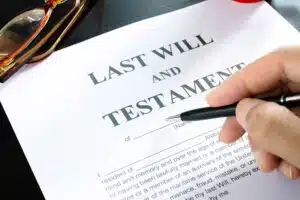The petition to probate will in common form is used in order to quickly appoint an executor to represent an estate without having to provide notification to anybody.
The petitioner chooses to file this petition with the probate court to ask them to declare that the will attached to the probate petition is the deceased’s actual last will and testament. He/she holds the burden of proof regarding the authenticity of the will.
Usually, presenting a self-proving affidavit, which is often attached to the will, will suffice. Or, the testimony of one of the witnesses to the will is considered proof of authenticity as well.
Benefits of Filing a Petition to Probate Will in Common Form
The petition to probate a will in common form is unique in that notice is not required, unlike in solemn form.
The petition to probate a will in common form requires neither the petitioner nor the Probate Court to give personal notice to any of the beneficiaries or heirs. As a result, this petition is considered useful in emergency situations, situations where it may be necessary to obtain control of an estate immediately.
What might be considered the downside to this petition is that it takes four years before it is considered final and binding. What this means is that an heir or beneficiary has four years to object to the petition or the will.
If the objection is successful, then the property that was distributed to the original beneficiaries may have to be returned. This probate petition is not thought of as the best choice for permanent administering of the estate.
Process
To file this petition, the petitioner must present both the proposed last will and testament of the deceased and the petition to the probate court. If the petitioner is unable to find a will, this petition should not be used.
Upon filing of this probate petition, the petitioner must disclose the names and addresses of all heirs to the probate court. However, the probate court is not required to send legal notice to anyone.
Once the petitioner is able to prove the authenticity of the will to the probate court, then the probate court will issue an order confirming that the will is, in fact, the last will and testament of the deceased.
The probate court’s order will then qualify the petitioner as the executor. After the petitioner has qualified, letters of testamentary will be issued by the probate court granting the executor power to administer and settle the estate of the deceased.
Need Some Advice?
Is there a situation with your loved one’s estate that demands quick action? Did your loved one own a business, or is there a bank trying to force a foreclose on their home? We want to help.
Call our office at (770) 920-6030 or use the form to schedule a free consultation.
